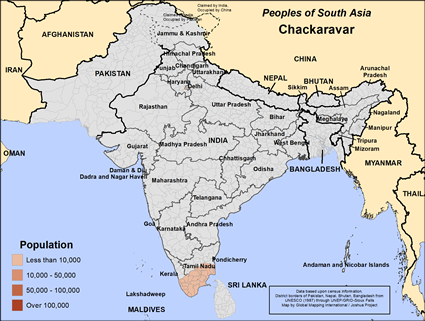The Chackaravar people have a long and storied history in India, particularly in the southern regions. They have traditionally been involved in agriculture and trade. The Chackaravar primarily speak Tamil, a key trade language in Tamil Nadu.
Today, the Chackaravar people live in rural villages, engaging in farming and small-scale trading. They cultivate crops such as rice, millet, and vegetables and many families also rear livestock. Their communities are close-knit, emphasizing strong family bonds and mutual support.
The Chackaravar people distinguish themselves from other groups through their unique blend of agricultural and trading expertise. Their deep knowledge of farming techniques and local commerce sets them apart from neighboring communities. The Chackaravar place a strong emphasis on maintaining family unity.
The Chackaravar's eating practices involve a diet primarily based on vegetarian food, including rice, lentils, vegetables all flavored with spices. They also enjoy traditional sweets and festive foods during celebrations. Their culinary practices emphasize simplicity, nutrition, and the use of locally available ingredients.
Their wedding practices are elaborate and deeply rooted in Hindu tradition. Weddings typically include rituals such as the exchange of garlands, sacred fire ceremonies and vibrant music and dance performances.
The Chackaravar people practice Hinduism, worshiping various deities and observing numerous religious rituals and festivals such as Diwali, Pongal, and Navratri. Their belief system emphasizes values like dharma (duty), karma (actions and consequences), and ahimsa (non-violence). They honor their ancestors through rituals and ceremonies, ensuring the transmission of their religious and cultural traditions across generations.
The Chackaravar people need better access to quality education to provide more opportunities for their children. Improved healthcare services are essential due to limited availability of medical facilities and high rates of preventable diseases. Economic support through modern agricultural techniques, market access, and vocational training can enhance their livelihoods. Infrastructure development, including better roads, clean water supplies, and reliable electricity, will greatly benefit the Chackaravar community. Addressing these needs will help the Chackaravar people achieve greater socio-economic stability while preserving their rich cultural and religious heritage.
Pray for the Chackaravar culture to be renewed and enhanced by a work of the Holy Spirit and shaped into a God-centered and God-honoring mold.
Pray for the Holy Spirit to move among Chackaravar family and community leaders to seek his face and enjoy his blessings.
Pray for the Lord to thrust out workers who will be compelled to nurture a Disciple Making Movement among the Chackaravar people.
Pray that soon the Chackaravar people will have faith that will lead them to live honorable lives that will draw others to the savior.
Scripture Prayers for the Chackaravar in India.
Cultural Traditions of Tamil Nadu, Ministry of Culture, Government of India, 2017.
Sharma, B.K., "Agricultural Practices in Southern India," Mittal Publications, 2012.
"Rural Development in India," Ministry of Rural Development, Government of In
| Profile Source: Joshua Project |











